




 |
 |
 |
 |
 |
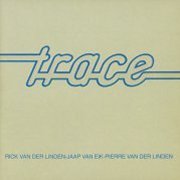 |
Trace (1974, 50.37/152.09) *****/TTTT½ (TTTTT) |
||
| Galliarde/Gare le Corbeau/Galliarde The Death of Ace The Escape of the Piper Once Progression A Memory/The Lost Past/A Memory Final Trace [2-disc ed. adds: Progress |
Tabu Bach-Atel (single) Another World (demo) Gnome Dance (demo) Final Trace (demo) Fairy Tale - Overture A Swedish Largo Gnome Dance Nocturne |
Bach-Atel Another World Escape of the Piper (extended) Once - Jam A Memory (demo) A Swedish Largo (demo) Once (demo)] |
|
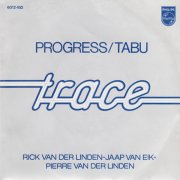 |
7" (1974) ****/TTT Progress Tabu |
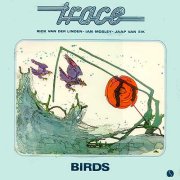 |
Birds (1975, 39.35/97.41) ****½/TTT½ (TTTT) |
||
| Bourrée Snuff In a Mist Opus 1065 Penny Trixie-Dixie King Bird First Avenue/Sculptor Bird Second Avenue/Preacher Bird Third Avenue |
Birdcorps Firecorps Birdcorps/Mail Bird/Fourth Avenue/ Soul Bird/Mail Bird/Sculptor Bird/ Second Avenue/Preacher Bird/ Last Avenue/King Bird/Reflection [2-disc ed. adds: Birds (edit) Tabu (second version) Birds (live) |
Tabu (live) Gaillarde (live) King-Bird (live) Gaillarde (live) Snuff (live) Gaillarde-reprise (live) Birds (live) Peace Planet (live)] |
|
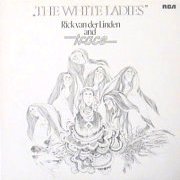 |
The White Ladies [as Rick van der Linden and Trace] (1976, 40.06/72.59) ***/T½ (TT½) |
||
| Legend (Part I) Interlude I Confrontation Interlude II Dance of the White Ladies Doubts Trace I Witches' Dance Surrender Interlude III Pathétique Legend (Part II) |
Interlude IV The Rescue Trace II Back Home Meditation Flash Back Conclusion [Expanded CD adds: Matthäus Passion (demo) Interlude - Part Two (demo) Dance of the White Ladies (demo) Doubts (demo) |
Witches' Dance (demo) Pathétique (demo) Legend (demo) Interlude - Part Four (demo) Back Home (demo 1) Meditation - for René (demo) Flashback (demo) Conclusion (demo) Back Home (demo 2) Fugue (live)] |
|
Current availability:
Mellotrons used:
Trace were put together by Dutch keyboard maestro Rick van der Linden after his departure from cheesy classical/rock crossover outfit Ekseption, bringing in bassist Jaap van Eik and ex-Focus drummer Pierre (no relation) van der Linden. Originally called Ace, the recently-formed UK band of the same name (of How Long infamy) forced van der Linden to rename his new band Trace; Grieg's Death Of Åse is renamed on the album as a tribute.
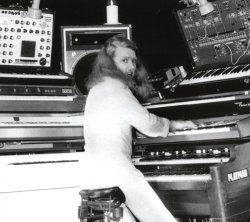 |
The outfit brought together the cream of the Dutch progressive scene, so it's no surprise that Trace is a phenomenal album. Opener Galliarde (segueing into bass solo Gare Le Corbeau before returning to the original piece) is an absolute stormer; I was grabbed by it on my very first hearing (thanks Brian!) and still love it all this time later. Basically a straight mix of Bach's Italian Concerto (Third Movement) and a traditional Polish dance tune, Galliarde rocks like a bastard, Rick's insanely virtuosic organ playing and the rhythm section blasting away like their lives depended on it. The slow-down to the Mellotron-led folk tune is stunning, Rick letting out a couple of incoherent yells on the part's repetition later in the track. Grieg's The Death Of Ace is a beautiful piano piece (also recorded by Ekseption on their contemporaneous release Bingo, amusingly), shifting into more familiar territory later in the track, while The Escape Of The Piper lurches into top gear once more, with energy levels rarely heard in the progressive arena. In fact, there's nary a duff track on the whole album, A Memory also standing out.
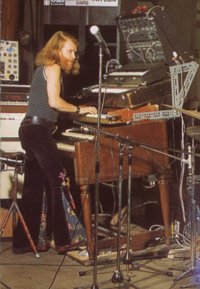 |
Rick used a huge arsenal of keyboards (see pics), including his ubiquitous Mellotron M400 (strings/choir/brass). As you can see, he uses it on almost every track, usually in rather unconventional ways, fading chords in and out unexpectedly on various sounds. The album's Mellotronic highlight has to be the previously-mentioned Polish dance section of Galliarde, but all the Mellotron work is worth hearing, although there's little of the Genesis/Yes approach here. In fact, the best way to describe the band is a manic cross between Focus and the best bits of ELP, although Rick avoids Emerson's tastelessness admirably, while still keeping the energy levels higher than you'd have thought possible.
The bonus tracks on the CD are worth hearing; Progress is, unsurprisingly, an edit of Progression, while Tabu is a Dizzy Gillespie tune onto which Trace stamp their distinctive sound. These came out as a single prior to the album's release and are worth hearing if you don't already own Trace on vinyl. Quick note for vinyl owners; the US Sire version has an inner sleeve with a band history/biography and track-by-track annotation, missing from the UK Vertigo issue.
By Birds, a year later, Pierre van der Linden had left, being replaced by Englishman Ian Mosley, later of Gordon Giltrap/Steve Hackett fame, before ending up in the prog graveyard better known as Marillion. The band's style had changed little in the intervening year, although the album probably has fewer of its predecessor's real highs. Side one starts brilliantly with Bach's Bourrée, but turns rather jazzy as the side progresses, which may or may not be considered a good thing, depending on your taste. Curved Air's Darryl Way guests on violin on some more Bach, Opus 1065, but the music seems to lack the direction of their debut. Side two's King Bird suite is effectively one long track split into repeating parts, rather like Focus' Eruption from Moving Waves, so my Mellotron annotation may be slightly awry. Most of the music is excellent, but the piece is slightly spoilt by Jaap van Eik's vocals on Preacher Bird; his singing is fine, but Trace were basically an instrumental band and an MOR vocal piece feels rather intrusive. I'm being picky, though; if this was the band's sole legacy, it'd still be regarded as a classic.
Oddly enough, the US version reverses the LP sides, putting the Birds suite on side one, also deleting the 'birds' cartoon strip from the European issue. Musea's CD version (as with their debut) adds both sides of a contemporaneous single, Birds being a reworked version of King Bird and Tabu being, unsurprisingly, a supposedly new version of Progress' b-side from a year earlier, although, frankly, I can't tell the difference. Fair bit of Mellotron on both, so again, it's worth picking up the CDs as against the vinyl.
By The White Ladies, Trace had become the sole preserve of Rick van der Linden; sadly, the album has to be regarded as something of a disappointment. A concept piece, it's based on the Dutch legend of the White Ladies, who steal a farmer's wife away from her husband and child. Unfortunately, there's some extremely naff narration by Harry Schäfer, not to mention more MOR vocals, this time courtesy of Hetty Smit, while much of the album is orchestrated. Despite all this, there's plenty of Rick's distinctive keyboard work (especially his unusual approach to the harpsichord); if the narration and vocal parts were removed, it wouldn't be a bad album. As it is, it's certainly listenable, if a bit cheesy at times; either way, better than Ekseption. As you can see, very little (obvious) Mellotron on the album, but the flute parts on Meditation are about as good as they get. Rick was obviously using a different tape frame for this part; I'm not entirely sure why he bothered with brass in the first place, to be honest. A little burst of choirs at the end of Conclusion and that's it. Rick later rejoined/reformed Ekseption, using his Mellotron one last time on Ekseption '78.
Pseudonym's 2014 two-disc edition of Trace outrageously triples the album's length, adding multiple variations on familiar material, not least A Swedish Largo, essentially several of the album's themes, notably Galliarde, played on obviously real church organ for almost twenty minutes, although Bach-Atel (subtitled 'single version', although there's no trace (ha ha) of it ever having been issued as a 7") and Another World are genuinely previously-unheard. I'd expected the extended version of Escape Of The Piper to add a few minutes to the end of the familiar version, but it suddenly goes off-piste about two minutes in, making me think it had a chunk taken out of it for the album version, rather than simply finishing early. Mellotron? On the majority of the extra material, unsurprisingly, used as on the album, strings or choirs swelling up out of nowhere and disappearing back there as quickly. This set is a real marathon, but an absolute essential for the band's fans.
Birds adds the better part of an hour's-worth of live material on its second disc, including part of a set from Stockholm, on April 7th 1975, a few days after the Oslo bootleg reviewed below. To be honest, the sound quality isn't much better, proper 'fans only' stuff, Rick's Mellotron (deliberately?) phased pretty much throughout and not used that heavily, anyway. The last five tracks date from a German gig the following year, also no better than bootleg-quality, are Mellotron-free, telling me that Rick left the Mellotron at home for that tour, although four minutes of Peace Planet (more Bach, in other words), otherwise unrecorded by Trace (although it's on an Ekseption album), make the extras worth having. The extra half hour on The White Ladies consists mainly of brief demo pieces for the album, largely, despite their recording quality, rather better listens than the official versions, frankly. Mellotronically speaking, the first four extra tracks feature it heavily, with polyphonic flutes and a trumpet melody on the Matthäus Passion demo, strings (under string synth) on Interlude - Part Two, more of the same on Dance Of The White Ladies and flutes and strings on Doubts, although all the other demos are either piano- or organ-based.
What a stupendous band! Why, oh why, are Trace not better-known? Until Musea's exhumation of these albums, Trace were a pretty well-kept secret on the progressive scene, despite good sales at the time; I can promise you won't be disappointed by their debut, but I advise caution as you work your way through their small catalogue. Now, all together, "Now ve shall play some Bach!"
Chateau Neuf, Oslo, Norway, 3rd April 1975 (65.16) ****½/TTKing BirdLargo A Memory/The Lost Past/A Memory Galliarde/Gare le Corbeau/Galliarde Snuff |
Ah, those were the days... When a band like Trace could play in Norway and (presumably) make a profit. I don't know if this rather ropily-recorded sixty-five minute recording is their full set or a radio broadcast edit, but it features the band's original lineup, Pierre Van Der Linden on drums and no second keyboard player. Like Focus, Trace would mess about with arrangements live, turning the twelve-minute studio version of Galliarde/Gare Le Corbeau/Galliarde into a twenty-minute tour de force, although encore Snuff cuts off mid-flow in true bootleg style, robbing us of more Trace madness.
Rick plays Mellotron on everything except drum solo The Lost Past and bass/drum duet Gare Le Corbeau, ignoring the ninety-second Snuff excerpt. The first burst of strings enters a few minutes into King Bird, under the ARP 2600, with upfront, phased choir chords a few minutes later and another burst of strings, string swells in Largo, major choirs on both parts of A Memory and the studio version's string and choir parts on Galliarde, although, of course, Rick had to prioritise, only being equipped with the regulation two hands, much as it may seem at times as if he were blessed with at least one spare.
See: Ekseption | Focus | Mistral